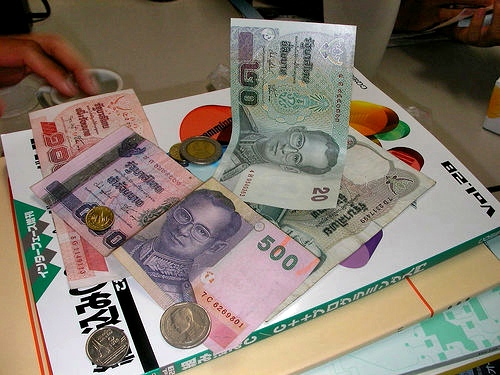
One of the questions I have been asked hundreds of times when it comes to teaching in Thailand is this one — is it possible to start teaching in Thailand after graduation?
In other words, can you get a teaching job as a new university graduate easily, quickly and with a salary you can live on?
Teaching in Thailand after graduation — what you need to know
If you just want a quick answer to that question, so you can start planning your trip, here is all you need to know.
Yes, you can easily get a teaching job in Thailand as a new graduate. In most cases, the day after you walk off the plane.
A day after that, you could be standing in front of your first class of Thai kids, if that is how fast you would like to get a teaching job.
If you would like to know more about teaching as a new graduate in Thailand, however, read on.

Getting a teaching job in Thailand is easy for a new graduate
Many Thai schools love to hire young western teachers straight out of university. They especially love to hire women, as there are far less women than men interested in teaching in Thailand (for some weird reason?).
That is why you will often find, as long as you have an undergraduate degree, just about every teaching job you apply for will either result in an interview or an immediate over-the-phone job offer.
That is why I always tell every young, new arrival in Thailand who wants to teach, come with enough money to last you at least six weeks.
That way you will have at least two weeks after you arrive to check out a huge number of teaching jobs. Then you can accept the one that looks the most interesting and pays the most.
And yes, applying for a job in Thailand is preferable to applying for one before you get here. There are too many scam agencies offering very low-paying teaching jobs to new graduates, and most Thai schools (except international schools) prefer to hire in-country.

What you will need to get a teaching job in Thailand as a new graduate
- A certified university degree in any subject and transcripts from a 4-year college
- TEFL or CELTA certification
** Special note: While some schools do ask for TEFL or CELTA certification, and it is supposedly a requirement placed by the Thai Ministry of Education in order to be able to get a work permit, in reality that is not usually the case.
I know plenty of people teaching here in Thailand with only a 4-year-degree and no TEFL or CELTA certification whatsoever.
Having said that, though, I do recommend you take a teaching certification course before you arrive here. It will help you get a better, more well-paying job, and it will give you experience standing in front of a classroom teaching.
You can also take a TEFL or CELTA course as soon as you arrive in Bangkok, or in most other Thai cities you may be interested in living in.
That is what I did when I arrived in Bangkok years ago — I signed up for a TEFL course. The course was excellent, what I learned was invaluable and, once I began to teach, I felt it really helped me in a Thai classroom.

How to get a job teaching English in Thailand as a new graduate
One of the best ways to get a job is to look at online job listings (avoid going to an agency, as many of them are pretty scammy).
The most comprehensive listing of current teaching jobs in Thailand is at a teaching website called Ajarn.
Their job listing service is updated several times a day, they cover jobs all over Thailand and, in my eight years of teaching in Bangkok, every teaching job offer I ever accepted was due to a listing on Ajarn.
Teaching Thailand also has a jobs board that is updated daily, and may have some jobs Ajarn does not.

Salaries teaching in Thailand as a new graduate
To be brutally honest, salaries for teaching in Thailand have not increased in around 25 years. And no, I am not lying.
In 2020, the average salary for a teacher in Bangkok is still between 30,000 baht to 55,000 baht. That was the average salary when I moved to Thailand in 2002. It was also the average salary when several other teachers I know moved to Thailand in the 1990s.
That is why, if you are looking for a high salary teaching English overseas, teaching in Japan or looking for a teaching job in South Korea should be your choice.
If, however, you want an amazing experience in a lovely country, surrounded by some of the nicest people in the world (the Thais), then Thailand is the right place for you.
If you can get a job with a salary of at least 38,000 baht a month (higher would be better), you can also live on that quite comfortably in Bangkok. You can definitely have a comfortable lifestyle on that kind of salary outside Bangkok.
If you accept a job at an international school, however, that salary could be anything from 60,000 baht a month to over 100,000 baht.
These jobs are better applied for outside Thailand before you arrive, however, as most international schools hire from abroad. Especially for jobs that are higher paying, and at the top tier international schools in the country.

Everything you ever wanted to know about teaching in Thailand as a new graduate
For hundreds more articles about teaching in Thailand, head to Tasty Thailand’s teaching section. We cover everything from how to get your dream job, and what should be included in an e-mail when applying for a teaching job, to what you need to know to apply for a work permit and some of the teaching materials you will need to teach in a Thai classroom.
Search the rest of Tasty Thailand for a ton of information about finding an apartment, buying clothing, furniture, shopping, eating out and traveling.
And, for an idea of what it is like to teach in Thailand, check out the short video below from a western woman teaching here. Just ignore the bit where she locks herself out of her house :).







